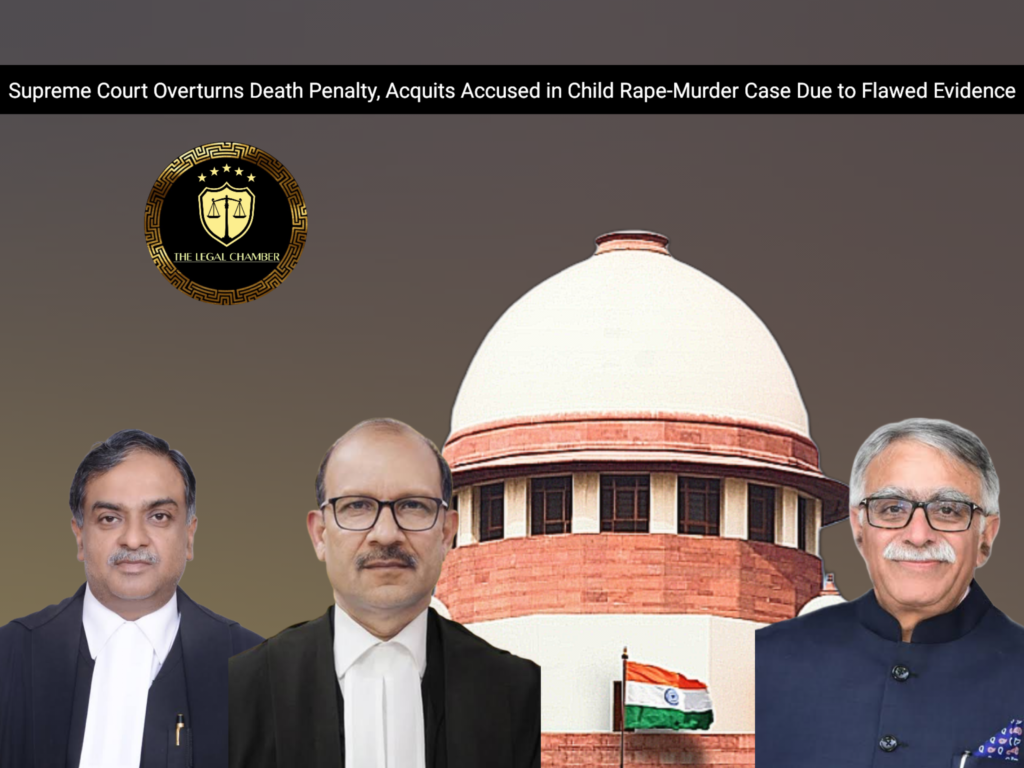
This Supreme Court judgment acquits the appellants, holding that in a case based purely on circumstantial evidence, the prosecution must establish a complete and unbroken chain of circumstances conclusively pointing to guilt. The Court found the evidence—including motive, last seen theory, and DNA reports—to be unreliable, incomplete, and failing to meet the standard of proof beyond a reasonable doubt required for a conviction, let alone the death penalty.
Facts Of The Case:
On November 20, 2014, a minor girl went missing from a wedding function at Sheeshmahal in Ramlila Maidan, Kathgodam, Uttarakhand. Her father lodged a missing report the next day. After an extensive search, her body was discovered on November 25, 2014, in a forest near the Gaula River, close to the venue. The post-mortem examination concluded the death was homicidal, caused by shock and haemorrhage resulting from injuries to the vaginal and perianal region consistent with a brutal sexual assault. The investigation, based on circumstantial evidence, led to the arrest of Akhtar Ali, who was apprehended in Ludhiana, and Prem Pal Verma, who was arrested locally. The prosecution’s case relied on the theory of last seen, motive, mobile location data, and a DNA report that allegedly matched Akhtar Ali’s profile with semen found on the victim. The trial court convicted both appellants, sentencing Akhtar Ali to death and Prem Pal Verma to rigorous imprisonment. The High Court largely upheld the convictions. The appellants then appealed to the Supreme Court, challenging the convictions primarily on the grounds of an incomplete chain of circumstantial evidence and serious lapses in the investigation.
Procedural History:
The procedural history of this case commenced with the conviction of the appellants by the Special Judge (POCSO)/Fast Track Court/Additional District & Sessions Judge, Haldwani, which sentenced accused-appellant No. 1, Akhtar Ali, to death and imposed rigorous imprisonment on accused-appellant No. 2, Prem Pal Verma. Aggrieved by this decision, the appellants preferred appeals before the Division Bench of the High Court of Uttarakhand at Nainital. The High Court, vide its common judgment, largely affirmed the convictions and sentences awarded by the trial court, including the confirmation of the death sentence for Akhtar Ali in a connected Criminal Reference. Subsequently, the appellants approached the Supreme Court by way of Special Leave Petitions, which were granted, leading to the present criminal appeals. The Supreme Court, after a thorough examination, set aside the impugned judgments, acquitted the appellants of all charges, and ordered their release.
READ ALSO :Landlords Can’t Evict Tenants for Minor Acts, Rules Supreme Court
Court Observation:
The Supreme Court made critical observations on the prosecution’s failure to establish a complete chain of circumstantial evidence. It found the alleged motive of lust to be unsubstantiated and the “last seen” theory unreliable due to belated witness statements and the non-examination of a key witness, Nikhil Chand, who first discovered the body. The Court held the arrest of Akhtar Ali from Ludhiana to be dubious and stage-managed, casting doubt on the subsequent DNA evidence. The DNA report itself was deemed untrustworthy due to scientific improbabilities, inconsistencies in sample analysis, and the questionable expertise of the analyst. Emphasizing the strict standards for capital punishment, the Court ruled that the broken chain of circumstances and resultant reasonable doubt necessitated acquittal, underscoring that the death penalty cannot be based on untrustworthy or manipulated evidence.
Final Decision & Judgement:
The Supreme Court allowed the appeals and set aside the impugned judgments of the High Court and the trial court. The Court acquitted both appellants, Akhtar Ali and Prem Pal Verma, of all charges leveled against them. It ordered their immediate release from custody, provided they are not required in any other case. The bail bonds furnished by the appellants were discharged. The Court’s decision was predicated on the fundamental failure of the prosecution to prove its case beyond a reasonable doubt, as the chain of circumstantial evidence was found to be neither complete nor conclusive.
Case Details:
Case Title: Akhtar Ali @ Ali Akhtar @ Shamim @ Raja Ustad vs. State of Uttarakhand CITATION: 2025 INSC 1097 CRIMINAL APPEAL No.: (Arising out of SLP (Criminal) No(s). 14-15 of 2020 and SLP(Criminal) No(s). 6573 of 2020) Date of Judgement: September 10, 2025 Judges/Justice Name: Justice Vikram Nath & Justice Sanjay Karol, and Justice Sandeep Mehta
Download The Judgement Here